Conflicts should be addressed through the prism of international rules and laws
Baku. 17 November. REPORT.AZ/ Report News Agency presents an interview with the Head of the EU Delegation to Azerbaijan, Ambassador Kestutis Jankauskas:
- What are the EU expectations from the upcoming fifth Eastern Partnership summit to be held in Brussels on November 24?
- The Eastern Partnership summit takes place every two years. So it is good opportunity on the very top level to take stock of the achievements, what has happened during several years. We have identified in Riga two years ago 4 (four) priority areas, we call them 20 key Deliverables for 2020. And they are about stronger economy, stronger governance, stronger connectivity and stronger society. I am sure that Headsof States and Governments and foreign ministerswill be engaged into discussion on what has been achieved, what is ongoing, what are the trends and hopefully to recommit to future of this program.
First of all, I would expect that Heads of State and Government to attend and engage actively in these discussions, shareachievements, discuss best practices and to set the goals for the future. Eastern Partnership offers to each partner possibilities according to the level of their ambition, tailored to what they want to have bilaterally with the EU. There is also a multilateral platform in many of these areas of cooperation. Best progress can be achieved if countries cooperate. For example, in the areas of energy, transport, digital hubs, trade and so on.
It is good opportunity to take stock on what has happened and also to set the goals.

- What documents are planning to be signed in the framework of the Eastern Partnership summit in Brussels?
- It is expected that the main document of the Eastern Partnership summit will be the Joined Declaration. It is currently being discussed and worked on intensively. We hope it will be ready to be adopted and published at the Summit.
This Declaration will probably have two Annexes on the 20 deliverables for 2020 and also on the setup of the multilateral frameworks.
Speaking of Azerbaijan and the EU, we are working right to finalize Common Aviation Agreement. We had the EU delegation here in Baku for intensive 48 hours negotiations. Now we use different other means, including modern communication technologies to finalize it, to agree the text that hopefully would be initiated at the Summit.
- Is the territorial integrity of the Eastern Partnership member countries issue was included to the final Declaration text?
- Unfortunately, the unresolved conflicts still remains the issue for most of the Eastern Partnership countries. This issue is important and there is no doubt about that. It is important for the partner countries involved and for the EU. It is our neighborhood. We are all interested that neighborhood to be secure, stable and prosperous.
My best guess, because the declaration has not been finalized yet, is that this important issue cannot be avoided and will be tackled by the Declaration.
The EU is consistently committed to support of the territorial integrity, independence and sovereignty of all partners, including Azerbaijan.
Our approach is that we need to look into all of these conflicts from the international perspective, from the general perspective based on international law, principles and norms. And we all want the peaceful settlement of this conflict.
The Summit itself will provide the opportunity to the countries that participate to discuss and to raise these issues.
By the way, few days ago the EU Council appointed the new EU Special Representative for South Caucasus. We are already working on his trip to Baku in nearest future.

- What are the achievements of Eastern Partnership program since previous Riga Summit?
- A lot of work has been done in the last two years in the framework of Eastern Partnership program and there is a good progress. Let me share few examples.
In the sphere of economy - In the last couple of years we have seen association agreements with deep and comprehensive free trade component coming into force for Georgia, Moldova and just recently for Ukraine. Huge EU market is now open for products of these countries. Trade binds us and we are already see increase in trade with these countries after coming into force of these agreements.
Second thing that binds us is people. Here we have introduced visa free travel for the citizens of Georgia and Ukraine. Previously Moldova was added. And we saw more people travelling to the EU. For example, in Georgia in the last 6 months after the introduction of visa free travel 90 thousand of Georgians used that. So there is a big potential in that.
I think Eastern partnership provide opportunities to bring our countries closer. Being closer we are stronger, we are all interested in modernization of societies and implementation of reforms and Eastern Partnership is an excellent platform to achieve that. So there have been a lot of good achievements in the last couple of years.

- What Eastern Partnership program has brought to Azerbaijan?
- I think in the last couple of years we have improved our relations, developed stronger economically. As you know, EU is the Azerbaijan's main trading partner. Almost 50 percent of the total trade is going with the EU. The EU remainsthe largest foreign investor in Azerbaijan.
EU has helped a lot in simplifying custom procedures, speeding up crossing of borders, modernizing border crossing points. We also kept working on the SouthernGas Corridor in the last 2 years. Certain stages are ready, but we still need to work on the TAP, we keep doing that. This project is crucially important for us, because it provides, first of all, alternative energy resources to the European market and for Azerbaijan it opens stable and reliable market for its hydrocarbons.
In the last couple of years Azerbaijan has embarked on very impressive program of the economic diversification. And in that you needed the most modern technologies, governance models, examples how to do modern reforms. EU has offered variety of projects through Twinning. In this Twinning Azerbaijan is the champion among the Eastern Partnership countries. Basically every institution has at least one twinning project with European experts coming and going, also staying in Baku and working, providing improvement in the variety of areas. In total Azerbaijan has benefitted from 46 twinning projects, more than any other Eastern Partnership country.13 of them are ongoing, 7 are still in preparation. It is excellent tool in our cooperation.
Also we have visa facilitation, Erasmus+ programs and hundreds of students have benefitted travelling and studying in the EU.
This year we have started the negotiation on the New Comprehensive Framework Agreement between the EU and Azerbaijan which will be the basis for our relationship. I've already mentioned Aviation Agreement negotiations, we started earlier but now we have intensified negotiations this year. We keep talking about Partnership Priorities which will establish the basis for the EU financial support for years to come. Last but not least, probably the best measure to measure the progress is the public opinion, and the positive public opinion about the EU in Azerbaijan has increased. So that's very good achievement and we need to build on that.

- Is visa free regime issue on the table now and what are the developments on that?
- Well, it is on the table for all Eastern partnership countries. As I mentioned Moldova has already benefitted from that earlier, then Georgia and Ukraine also benefitted from that. If Azerbaijan is ready, EU is also ready to work towards that goal. First of all, we need to examine carefully where we are on the implementation of visa facilitation and the readmission agreements–the two that we have already signed and which are functioning. There is a lot of technical work to measure the progress in implementation towards certain benchmarks in order to present it for the decision of the EU member states to launch the dialogue on the preparations of visa liberalization. We keep working on that and if we mutually see the interest and readiness I think we could be ready to go that way.
- How do you see future perspectives of Eastern Partnership program taking into account Russia's influence on some countries like Armenia, Moldova, Belarus and unresolved conflicts in the region?
- I think Eastern Partnership is a very good framework for advancement of our relationship. We have shared goals of stability, security and prosperity in our region. It allows each country to develop its own relationship measured by level of ambition of that country - what do you want, how do you want your relationship to be with the EU. At the same time, it offers the multilateral platform for developing of the projects which need closer cooperation, cross border decisions, like transport, energy projects etc.
Recently the EU has adopted its new Global Strategy. That strategy clearly says that we are willing to work more towards implementation of the multilateralism and first of all making an impact in achieving democracy, security, stability in our closest Eastern neighborhood.

Each country has a right to choose its own security arrangements. Unfortunately, we have seen Russians actions in last several years, and we all have seen the results of these actions. We need to learn lessons and adjust to that behavior. I would argue that our actions after these events have increased resilience in the EU and Eastern partnership countries against negative influences from outside. In these cases, we need to focus on the areas where can achieve progress, areas which are within our reach, and not to complain or wish much in the areas which are not within our reach. We can do a lot in strengthening of our resilience, building prosperity, security and stability.
Azerbaijan is not the only one affected by the conflicts. Unfortunately, we have seen other developments. We believe that all of these conflicts should be addressed first of all through the prism of international rules and laws, through very clear and big support for the territorial integrity, sovereignty and independence. EU does support that and does support the existing frameworks for settlement of these conflicts. Here you have one, and we clearly support that. Appointment of new EU Special Representative will help to focus our attention and contribution where we can.
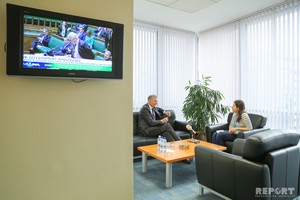
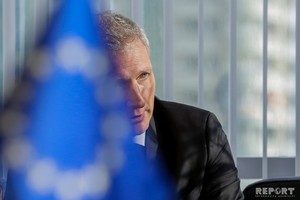
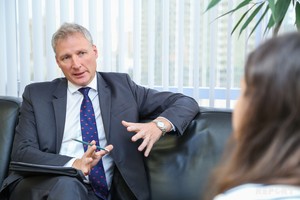
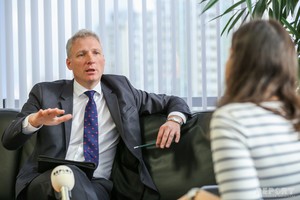
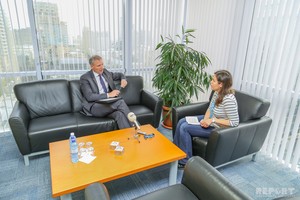


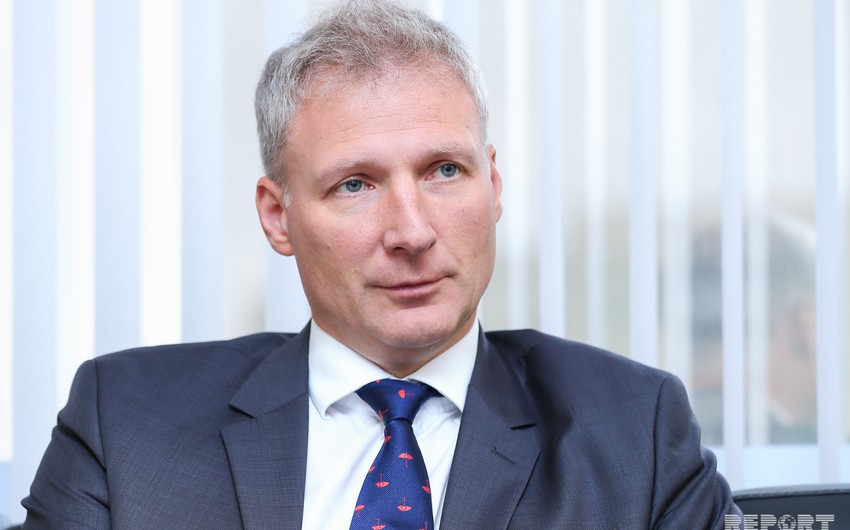 https://static.report.az/photo/a0f89dfe-7b7d-48c2-844e-5adda1aa69cf.jpg
https://static.report.az/photo/a0f89dfe-7b7d-48c2-844e-5adda1aa69cf.jpg

